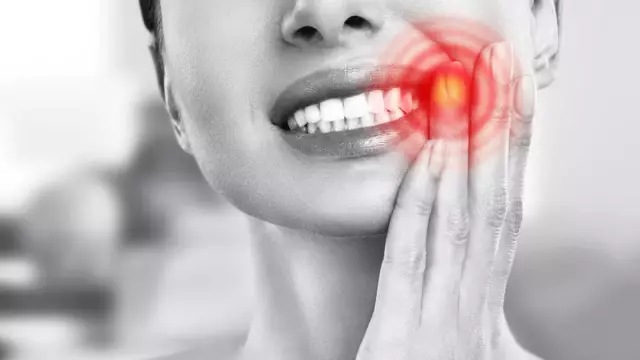- Author Curtis Blomfield blomfield@medicinehelpful.com.
- Public 2023-12-16 20:44.
- Last modified 2025-01-23 17:01.
Brushing your teeth in the morning and in the evening is how our parents taught us. Unfortunately, not everyone followed this rule, so by adulthood, most of the teeth cannot be restored. Tooth damage often begins with gum disease. The appearance of swelling is the first sign of tissue infection. The main types of gum disease are gingivitis and periodontitis.
Gingivitis is the reddening of the gums due to an infection in the mouth. Quite often, the disease is accompanied by bleeding when brushing your teeth.
Periodontitis is the next stage of gingivitis. If you stubbornly do not go to the dentists, then the bone sockets holding the tooth will begin to collapse, and most of the teeth cannot be saved. These are very dangerous gum diseases that need to be treated early.

How to determine if the gums are affected? Unfortunately, most people suffer from this disease, another question: in what form? Often the disease progresses so slowly that teeth are retained throughout life. Howeverthis is possible if you somehow monitor the cleanliness of the oral cavity.

Most of the diseases of the teeth and gums appear due to plaque on them. It contains the very harmful bacteria, and every day there are only more of them. Therefore, it is necessary to regularly remove plaque with a brush and a special floss.
Unfortunately, gum disease is not accompanied by pain, so it is difficult to prevent the disease in the early days. To prevent the disease from progressing, it is recommended to visit the dentist's office periodically. Otherwise, fistulas may form, then an abscess and pus. If symptoms are ignored, subsequent treatment may be difficult.
The first symptom of gum disease is bleeding. It can remain on the toothbrush or start to flow in the process of eating. In addition, sore gums are the cause of bad breath.
If you suspect gum disease, you should immediately contact your dentist. Your doctor will examine your mouth for signs of periodontitis. In addition, you will have to take an x-ray so that the specialist can determine in which part of the bone hole the destruction began. It is very important to see a qualified specialist so that the correct treatment can be prescribed.

If the suspicions are justified, and periodontitis is found in the oral cavity, the doctor will initially clean the teeth well and teach you how to remove plaque on your own. Thus, the need for re-treatmentwill be virtually eliminated.
After the teeth are freed from plaque and calculus, in some cases it becomes necessary to clean the roots. Then freezing is out of the question. When the anesthesia wears off, the feeling of discomfort will persist for several days.
Unfortunately, periodontitis cannot be completely cured. It is for this reason that a dentist should give advice on proper oral care. Provided that all the advice of a specialist is taken into account, the manifestation of gum disease can be completely excluded.






